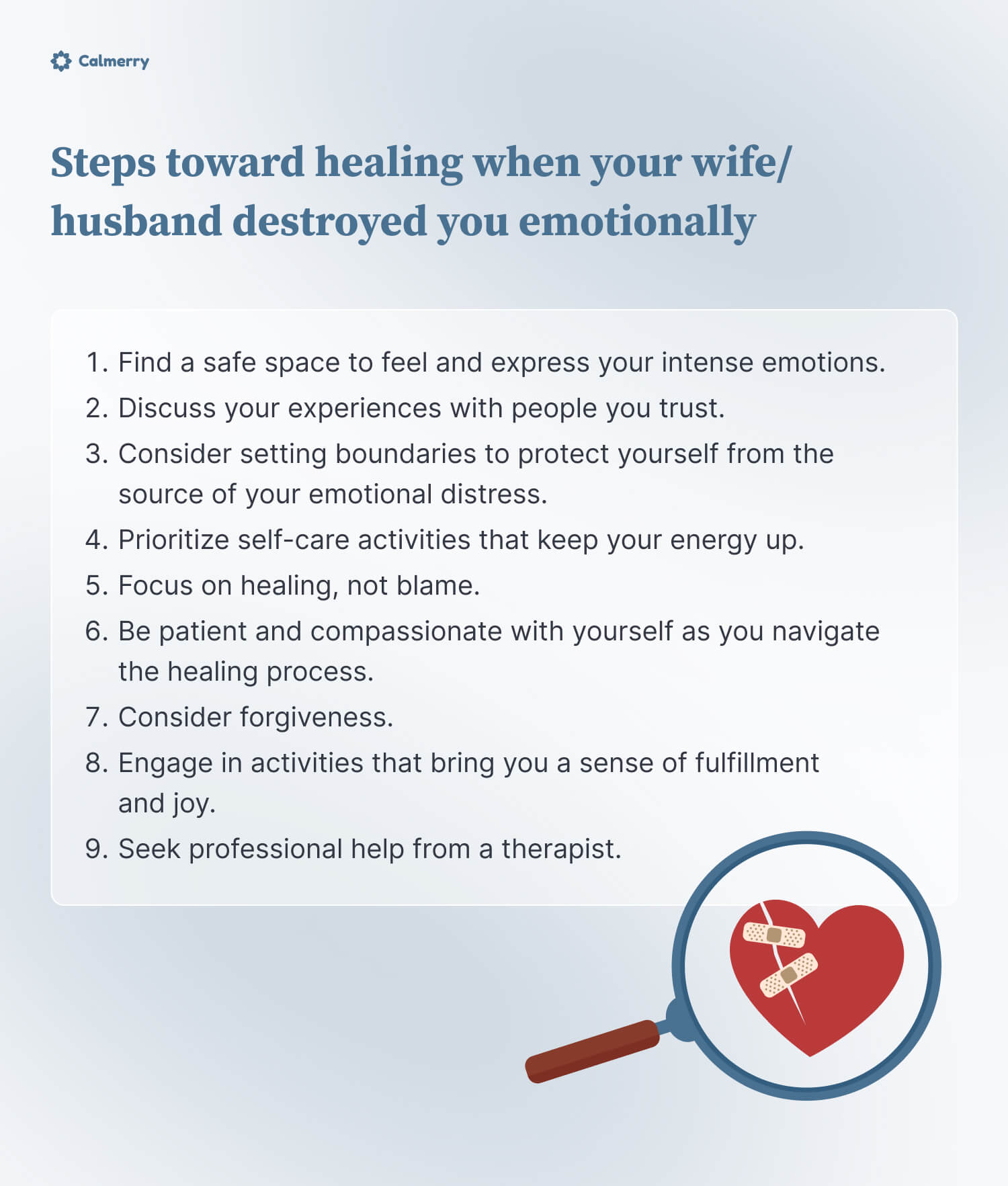“My Husband/Wife Has Destroyed Me Emotionally” – Ways to Heal and Regain Your Well-Being

In this article
Marriage conflict happens, and it’s expected to move through waves of tension and periods of growth. Arguments and rough patches are not necessarily indicators of a pending divorce or a significant shift in your relationship.
But if you have ever felt that your husband, wife, or intimate partner has destroyed you emotionally, you may be left wondering what to do.
You could be looking for ways to move past or through turmoil. You want to decide what is best for your future and your relationship, which can be exceedingly difficult when your emotions have been riding a roller coaster for a while. You may feel worn out and like your self-esteem has been shaken by things your partner has said or done.
“My husband has destroyed me emotionally” or “my wife has destroyed me emotionally” is a truth that you may be recently coming to terms with. It can be hard to wrap your head around the idea that someone you love has caused this much pain.
Coping with emotional pain caused by a loved one can be incredibly difficult. Emotional trauma can shatter the sense of trust and security that is foundational in a marriage. Fortunately, with some guidance and patience, you can take steps to heal and regain your well-being.
– Rychel Johnson, M.S., Licensed Clinical Professional Counselor (LCPC)
Reasons you might feel emotionally destroyed by your spouse
A spouse plays an essential role in the life of a married person. Because of this truth, simple words can carry a lot of power when spoken by a spouse.
When we live with someone and share intimate details of our emotions and concerns with this one person, the damage feels worse when they hurt our feelings.
Over time, a married couple develops unique emotional connections that are different from any other relationship, much like a fingerprint is one-of-a-kind.
A spouse’s words or actions, whether malicious or innocent, can create a significant ripple effect. After significant conflict or ongoing verbal abuse, there may be lost trust and a decrease in security in the safety of the marriage.
Feeling emotionally destroyed by a spouse can be a complex and distressing experience that creates additional relationship challenges.
Here are some potential reasons why someone might feel emotionally devastated by their spouse:
- Betrayal and trust issues – experiencing a betrayal through infidelity, deception, or broken promises can be deeply emotionally distressing.
- Communication issues – a lack of effective communication can lead to misunderstandings, frustration, and emotional distance.
- Emotionally or verbally abusive actions – emotional abuse or verbal abuse in the form of constant criticism, manipulation, or demeaning behavior can lead to feelings of worthlessness and devastation.
- Unresolved conflict – when issues remain undiscussed, it can contribute to emotional distress.
- Lack of emotional support – feeling unsupported or emotionally neglected by a spouse can lead to a sense of isolation and emotional devastation.
- Loss of connection – changing priorities, busy schedules, or personal growth (despite feeling positive) can cause couples to drift apart emotionally.
- Mental health and addiction – personal struggles such as mental health issues, addiction, or unresolved trauma can contribute to destructive patterns.
- Narcissistic abuse or personality traits – partners with narcissistic tendencies or difficulty connecting with and understanding the emotions of others may not be able to offer the empathy needed in emotionally distressing situations.
- Financial stress – money-related stress can increase tension, arguments, and emotional distress.
- Unmet expectations – significant disparities between expectations and reality can lead to disappointment and feeling unfulfilled.
- Cultural or societal pressures – if these factors create tension or conflict within the relationship, it can lead to emotional distress.
Steps toward healing when your wife/husband destroyed you emotionally
You likely want to start feeling better and more capable of engaging in your marriage in a healthy way. It is difficult to know where to start in the healing process because most marriage distress doesn’t happen overnight. The issues might start small or feel harmless until suddenly they are bigger than you can handle or even comprehend.
Part of healing after relationship struggles must focus on rediscovering a sense of self or identity. We can’t honestly examine our concerns or a need for growth in a marriage context until we’ve looked inward at our personal needs and emotions.
– Rychel Johnson, M.S., Licensed Clinical Professional Counselor (LCPC)

Here are some steps to consider when working toward rediscovering your sense of self:
1. Acknowledge your feelings
Recognizing and accepting the emotions you’re experiencing is essential. Complex feelings will feel raw and unhinged at times. Allow yourself to feel the pain, sadness, anger, or other emotions that rise to the surface.
Feelings cannot harm you on their own, but they feel intense at times, and like they’ll last forever. Find a safe space to feel and express your intense emotions, alone or with support.
2. Seek support
Discussing your experiences with people you trust can be therapeutic, and having a support system can provide comfort and understanding.
Contact close friends, family, a spiritual mentor, or a support group to share your feelings. Perhaps someone in your immediate circle has endured marriage stress and is willing to share their experience. You don’t have to do this alone.
3. Set boundaries
Consider setting boundaries to protect yourself from the source of your emotional distress. You may need to temporarily limit or stop contact with your spouse to work toward feeling better.
Or someone else in your life has negatively influenced your marriage, and it is in your best interest to limit contact with them now as you process your thoughts and emotions.
Setting boundaries benefits your well-being as you can work to restore your energy and ability to decide how to proceed with relationship logistics.
4. Take care of yourself
Your physical and emotional well-being are precious resources, particularly as you endure emotional distress in your marriage. Get enough rest, eat nourishing foods that make your body feel good, and engage in activities that bring you joy.
Additionally, prioritize self-care activities that keep your energy up: physical exercise, meditation, reading, or any activity that helps you relax and recharge can be beneficial.
5. Focus on healing, not blame
You may feel angry or resentful. It’s normal to feel a lot of conflicting, confusing feelings. However, dwelling on feelings that perpetuate your stress isn’t helpful.
While it’s natural to feel anger or resentment, shift your focus from blaming the other person to healing. Understand that healing is a process, and it’s okay to prioritize your well-being.
6. Set realistic expectations
Healing takes time; setting realistic expectations for yourself is crucial. Be patient and compassionate with yourself as you navigate the healing process.
Healing is multi-layered and doesn’t always feel linear. It might even feel like your emotions are more scattered and extreme as you move toward feeling better. With time and self-compassion, the journey toward healing will begin to feel less tumultuous. You’ve got this.
– Rychel Johnson, M.S., Licensed Clinical Professional Counselor (LCPC)
7. Consider forgiveness
Forgiveness is a personal choice and does not necessarily mean condoning the other person’s behavior. It can be a way to release some of the intense emotional burden you carry and free yourself from holding onto resentment.
If your religion or belief system encourages forgiveness, discussing your concerns with a spiritual support system can be helpful.
8. Explore new hobbies and interests
Engage in activities that bring you a sense of fulfillment and joy. New or renewed interests can distract your mind from negative thoughts and create a positive focus.
Consider joining a team sport if you favor physical activity or join an interest or hobby group. If being around people feels difficult, hobbies like reading or crafting can be helpful.
You deserve joy, even when your marriage has caused emotional turmoil and stress.
9. Seek professional help
A mental health professional can offer valuable guidance and support and help to equip you with strategies to work through the emotional distress you are experiencing.
Therapists and counselors can help you navigate your emotions and create a plan for moving forward with your relationship.
You deserve to be heard and supported in this way, and plenty of resources are available.
Seeking professional support at Calmerry
As mentioned previously, social support is precious when your spouse hurts you emotionally. While sharing your stress with others may feel daunting, it may surprise you that your friends or family members are willing to share their experiences and offer coping strategies that have served them.
Having personal sources of support is irreplaceable while you’re processing stressors and moving toward a healing space.
Additionally, therapy offers support that is different from friendships and family relationships: therapists and counselors have specialized training to separate their influence and emotions from your stressful experience.
Having another set of ears for your concerns in the form of a therapeutic relationship can offer unbiased or neutral perspectives.
Addressing emotional distress from your marriage takes time and, often, some dependable professional help. Individual counseling and support groups for people in similar situations can offer the support you need while you sort through the roots of what caused your marriage issues.
As you walk a healing path, online therapy at Calmerry can be convenient and beneficial to help guide you through this time.
online therapy
live video session



